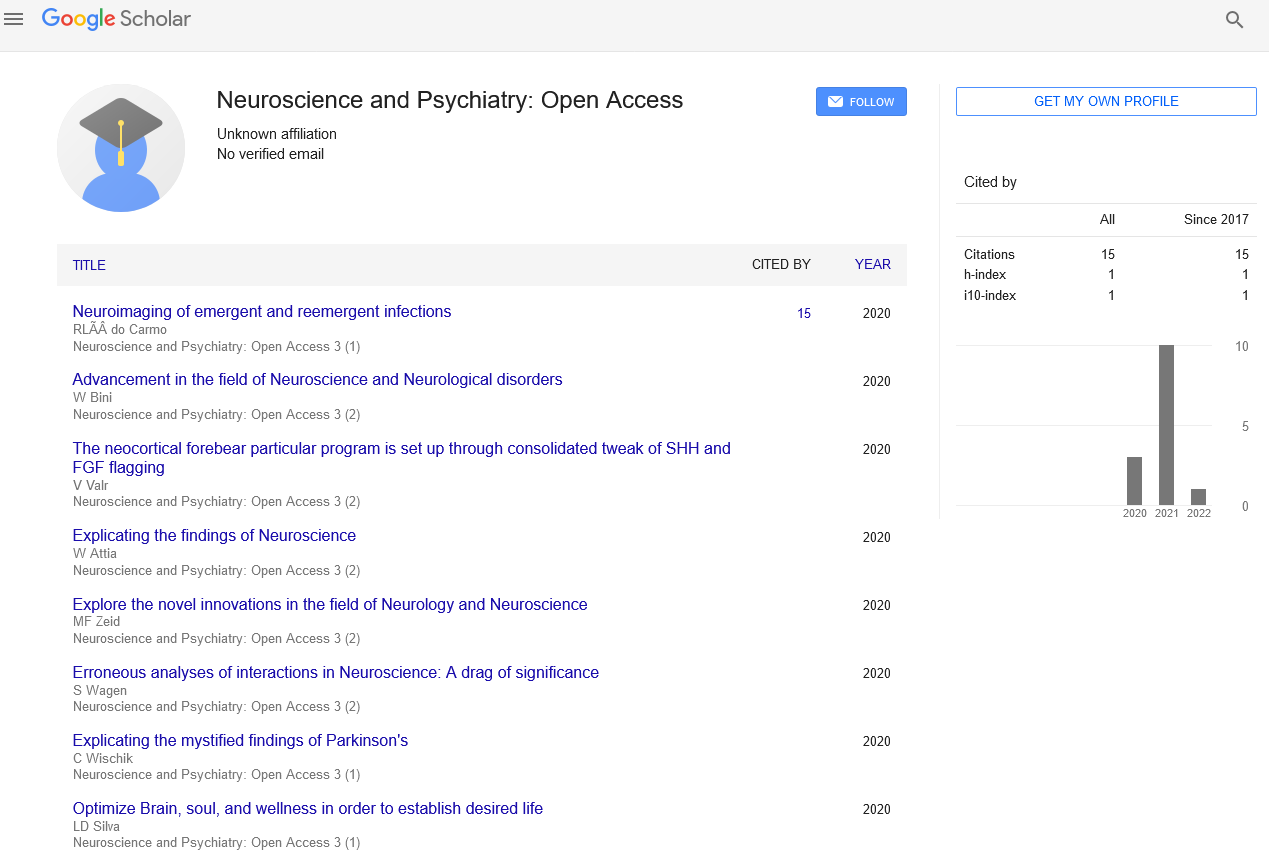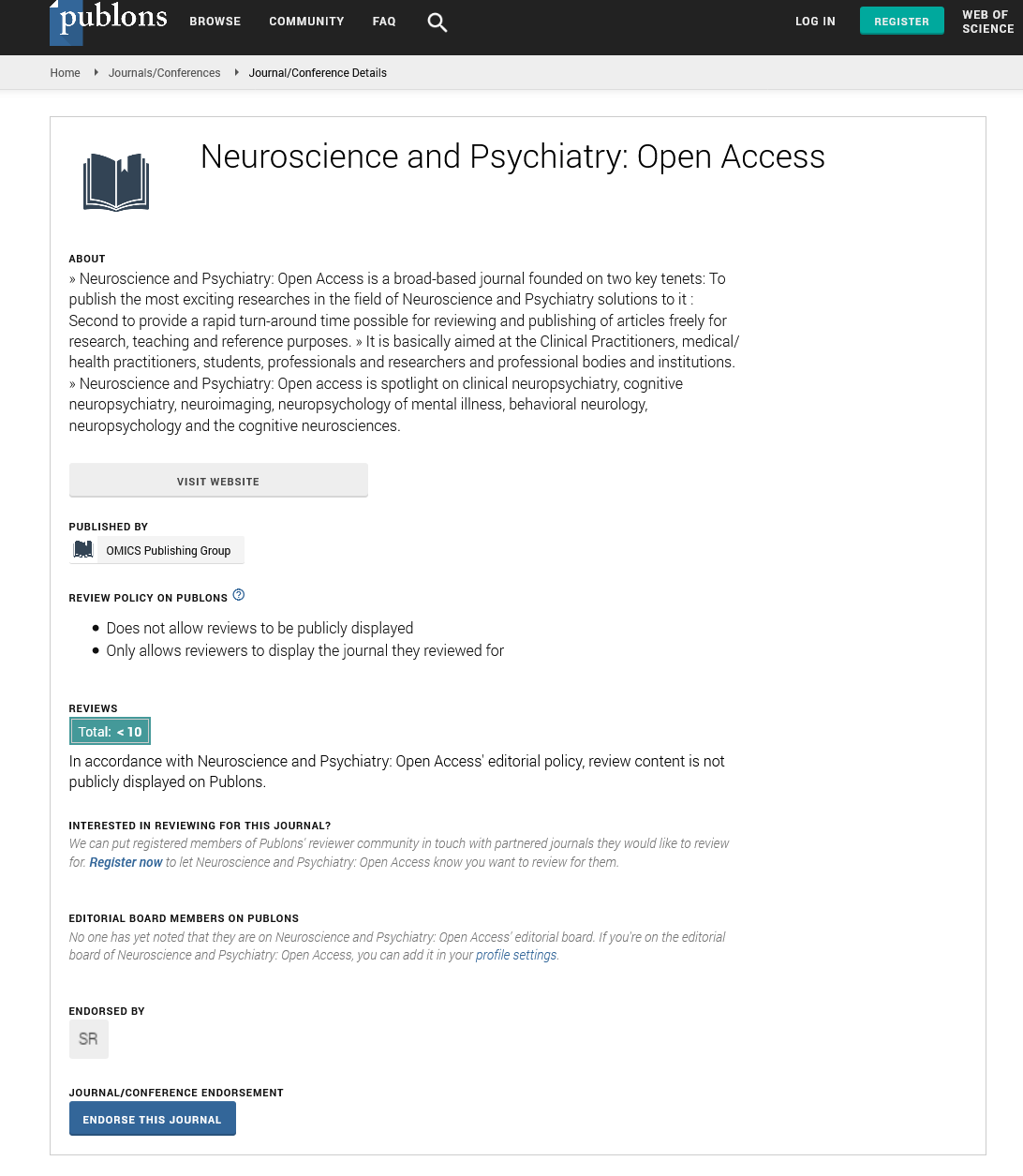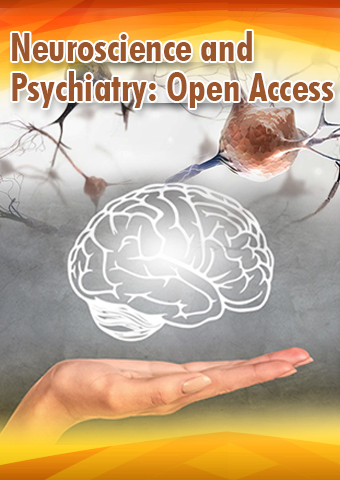Perspective - Neuroscience and Psychiatry: Open Access (2024) Volume 7, Issue 1
Unraveling the Intricate Dance of Neuroscience and Psychiatry
- Corresponding Author:
- Heidi Meyer
Department of Psychiatry, Zucker School of Medicine at Northwell/Hofstra, New York, USA
E-mail: hcmey@bu.edu
Received: 05-01-2024, Manuscript No. NPOA-23-119210; Editor assigned: 08-01-2024, PreQC No. NPOA-23-119210 (PQ); Reviewed: 22-01-2024, QC No. NPOA-23-119210; Revised: 01-02-2024, Manuscript No. NPOA-23-119210 (R); Published: 09-02-2024, DOI: 10.47532/npoa.2024.7(1).172-174
Introduction
Neuroscience and psychiatry are two closely related disciplines that play a fundamental role in understanding the complexities of the human mind. While they may seem distinct, their interplay is essential for comprehending the basis of mental disorders, developing effective treatments, and promoting mental health. This article explores the dynamic relationship between neuroscience and psychiatry, shedding light on how they work together to advance our understanding of the human brain and the treatment of psychiatric conditions.
Description
The interconnected world of neuroscience and psychiatry
Neuroscience: A glimpse into the brain: Neuroscience is the scientific study of the nervous system, including the brain, spinal cord, and peripheral nerves. It delves into the intricate cellular and molecular processes that govern how the brain functions and communicates with the rest of the body. Neuroscience aims to unravel the mysteries of the human brain, from its structure to its cognitive and emotional functions.
Recent advancements in neuroscience have revolutionized our understanding of the brain. Technologies like functional Magnetic Resonance Imaging (fMRI) and Electroencephalography (EEG) allow researchers to observe brain activity in real-time, providing invaluable insights into the neural mechanisms underlying human cognition, emotion, and behavior.
Psychiatry: The clinical aspect: Psychiatry, on the other hand, is a medical specialty that focuses on the diagnosis, treatment, and prevention of mental disorders. It is deeply rooted in the principles of medicine, psychology, and biology, and it is the bridge that connects the findings of neuroscience with the clinical aspects of mental health.
Psychiatrists are medical doctors who diagnose and treat a wide range of mental health conditions, including mood disorders, anxiety disorders, psychotic disorders, and more. They utilize a combination of psychotherapy and medication to help individuals manage and recover from these conditions. Psychiatry plays a critical role in addressing the real-world impact of mental health issues on individuals’ lives.
The collaborative nature of the two disciplines
The relationship between neuroscience and psychiatry is collaborative and symbiotic. They work together to advance our understanding of the brain and to improve the lives of individuals affected by mental health issues.
Understanding the brain
Neuroscience provides psychiatry with a solid foundation of knowledge about the brain. It offers insights into the neurobiology of mental disorders, shedding light on the underlying causes, neurochemical imbalances, and structural abnormalities. This knowledge is crucial for developing effective treatments and interventions.
For example, research in neuroscience has identified specific brain regions and neural pathways involved in conditions such as depression and schizophrenia. This knowledge has led to the development of medications that target these areas, offering individuals with these disorders a chance at improved mental well-being.
Advancing diagnostic precision
Psychiatry benefits from the advances in neuroscience by enhancing the accuracy of psychiatric diagnoses. For instance, neuroimaging techniques like fMRI and PET scans can provide valuable data that help psychiatrists identify abnormalities in brain structure and function. These diagnostic tools can be especially valuable in cases where symptoms are ambiguous, such as in the early stages of neurodegenerative diseases.
Additionally, research in genetics and epigenetics has revealed the role of specific genes and environmental factors in the development of mental disorders. This knowledge helps psychiatrists consider a person’s genetic predisposition and environmental history when diagnosing and developing personalized treatment plans.
Targeted treatments
The collaboration between neuroscience and psychiatry has led to the development of more targeted and effective treatments for mental disorders. Medications designed to modulate neurotransmitter levels, such as Selective Serotonin Reuptake Inhibitors (SSRIs) for depression, have been created with the understanding of how these neurotransmitters function in the brain.
Furthermore, therapies like Cognitive Behavioral Therapy (CBT) and Dialectical Behavior Therapy (DBT) are grounded in the principles of neuroscience. They are designed to modify dysfunctional thought patterns and behaviors by rewiring neural pathways in the brain, offering individuals practical tools to manage their mental health conditions.
Neuroscience also plays a crucial role in developing innovative treatments, such as Transcranial Magnetic Stimulation (TMS) and Deep Brain Stimulation (DBS), which directly target specific brain regions to alleviate symptoms in conditions like major depressive disorder and Parkinson’s disease.
Uncovering the brain’s resilience
Understanding the brain’s ability to adapt and rewire itself, known as neuroplasticity, is another area where neuroscience and psychiatry converge. Research in this field has shown that the brain can recover from damage and adapt to new challenges, providing hope for individuals with mental health conditions.
For example, cognitive rehabilitation therapies harness the brain’s plasticity to improve cognitive function in individuals with conditions like traumatic brain injury or dementia. Similarly, mindfulness-based therapies have shown how the brain can be trained to reduce stress and improve emotional regulation, offering valuable tools for individuals with anxiety and mood disorders.
The challenges and ethical considerations
While the collaboration between neuroscience and psychiatry has undoubtedly brought about significant advancements, there are challenges and ethical considerations that deserve attention.
Reductionism vs. Holism: One ongoing debate revolves around the balance between reductionist approaches in neuroscience, which seek to understand mental disorders at the cellular and molecular level, and holistic approaches in psychiatry, which consider the broader context of an individual’s life. Striking the right balance is essential to avoid oversimplifying complex mental health issues or overlooking the psychosocial factors that contribute to them.
Ethical concerns: The use of advanced neuroimaging techniques, such as functional MRI, for research and clinical purposes raises ethical concerns regarding privacy, consent, and the potential for stigmatization. As our ability to probe the brain’s inner workings deepens, it becomes increasingly important to establish ethical guidelines that protect individuals and ensure that their data is used responsibly.
Personalized medicine: Personalized medicine, which tailors treatments to an individual’s unique genetic and neurobiological makeup, is an exciting frontier in the field of psychiatry. However, it raises questions about equitable access to such treatments and the potential for increasing healthcare disparities.
Conclusion
The dynamic relationship between neuroscience and psychiatry continues to evolve, offering new insights and avenues for understanding and treating mental disorders. This collaborative effort has allowed us to delve deeper into the intricacies of the human brain, leading to more targeted treatments and innovative therapeutic approaches.
While challenges and ethical considerations remain, the future holds promise for a more holistic and personalized approach to mental healthcare. As these two disciplines continue to inform and shape each other, the prospects for better mental health and well-being for all continue to grow. Neuroscience and psychiatry, intertwined in their pursuit of understanding the human mind, offer hope for a brighter future in the realm of mental health.


